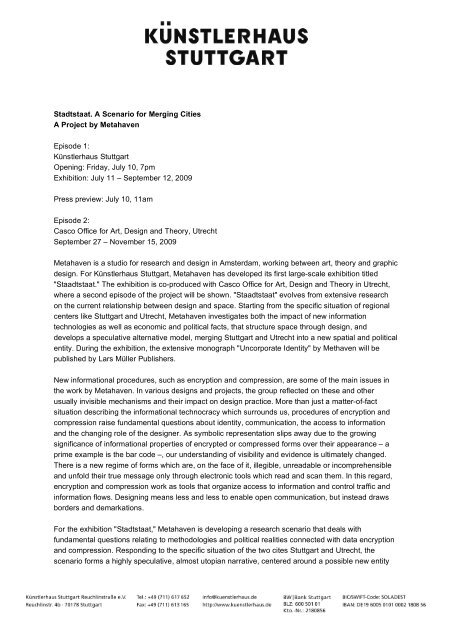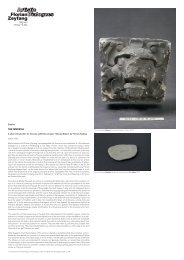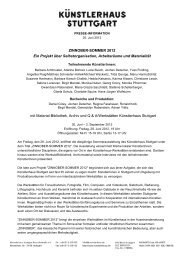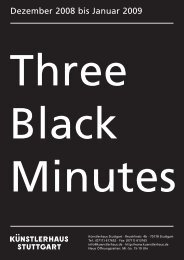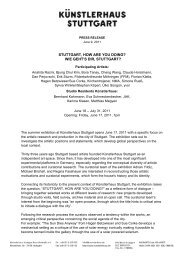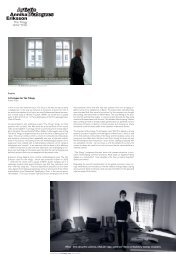Stadtstaat. A Scenario for Merging Cities A Project by Metahaven ...
Stadtstaat. A Scenario for Merging Cities A Project by Metahaven ...
Stadtstaat. A Scenario for Merging Cities A Project by Metahaven ...
Create successful ePaper yourself
Turn your PDF publications into a flip-book with our unique Google optimized e-Paper software.
<strong>Stadtstaat</strong>. A <strong>Scenario</strong> <strong>for</strong> <strong>Merging</strong> <strong>Cities</strong><br />
A <strong>Project</strong> <strong>by</strong> <strong>Metahaven</strong><br />
Episode 1:<br />
Künstlerhaus Stuttgart<br />
Opening: Friday, July 10, 7pm<br />
Exhibition: July 11 – September 12, 2009<br />
Press preview: July 10, 11am<br />
Episode 2:<br />
Casco Office <strong>for</strong> Art, Design and Theory, Utrecht<br />
September 27 – November 15, 2009<br />
<strong>Metahaven</strong> is a studio <strong>for</strong> research and design in Amsterdam, working between art, theory and graphic<br />
design. For Künstlerhaus Stuttgart, <strong>Metahaven</strong> has developed its first large-scale exhibition titled<br />
"Staadtstaat." The exhibition is co-produced with Casco Office <strong>for</strong> Art, Design and Theory in Utrecht,<br />
where a second episode of the project will be shown. "Staadtstaat" evolves from extensive research<br />
on the current relationship between design and space. Starting from the specific situation of regional<br />
centers like Stuttgart and Utrecht, <strong>Metahaven</strong> investigates both the impact of new in<strong>for</strong>mation<br />
technologies as well as economic and political facts, that structure space through design, and<br />
develops a speculative alternative model, merging Stuttgart and Utrecht into a new spatial and political<br />
entity. During the exhibition, the extensive monograph "Uncorporate Identity" <strong>by</strong> Methaven will be<br />
published <strong>by</strong> Lars Müller Publishers.<br />
New in<strong>for</strong>mational procedures, such as encryption and compression, are some of the main issues in<br />
the work <strong>by</strong> <strong>Metahaven</strong>. In various designs and projects, the group reflected on these and other<br />
usually invisible mechanisms and their impact on design practice. More than just a matter-of-fact<br />
situation describing the in<strong>for</strong>mational technocracy which surrounds us, procedures of encryption and<br />
compression raise fundamental questions about identity, communication, the access to in<strong>for</strong>mation<br />
and the changing role of the designer. As symbolic representation slips away due to the growing<br />
significance of in<strong>for</strong>mational properties of encrypted or compressed <strong>for</strong>ms over their appearance – a<br />
prime example is the bar code –, our understanding of visibility and evidence is ultimately changed.<br />
There is a new regime of <strong>for</strong>ms which are, on the face of it, illegible, unreadable or incomprehensible<br />
and unfold their true message only through electronic tools which read and scan them. In this regard,<br />
encryption and compression work as tools that organize access to in<strong>for</strong>mation and control traffic and<br />
in<strong>for</strong>mation flows. Designing means less and less to enable open communication, but instead draws<br />
borders and demarkations.<br />
For the exhibition "<strong>Stadtstaat</strong>," <strong>Metahaven</strong> is developing a research scenario that deals with<br />
fundamental questions relating to methodologies and political realities connected with data encryption<br />
and compression. Responding to the specific situation of the two cites Stuttgart and Utrecht, the<br />
scenario <strong>for</strong>ms a highly speculative, almost utopian narrative, centered around a possible new entity
with a new political agenda. The exhibition will present research material, branding proposals and<br />
detailed design applications <strong>for</strong> a new type of city-state, in which Stuttgart and Utrecht will be merged<br />
or "compressed." The works and models in the exhibition operate between in<strong>for</strong>mation architecture<br />
and experimental branding, focusing on the notion of legibility and the relation of in<strong>for</strong>mation and<br />
space. Thematically, the exhibition presents possible alternatives to current <strong>for</strong>ms of border<br />
management both in graphical and architectural space, discussing the issue of encryption and<br />
compression beyond its meaning in in<strong>for</strong>mation technology and exploring the resulting effects on<br />
politics and visual epistemology. The fictional brand represents a radical policy experiment that<br />
critically examines current procedures of city branding as well as possible alternatives to the neoliberal<br />
political agenda. In this new city-state, the biometric profiling, face recognition, RFID tagging and data<br />
mining, which dominate in the international geopolitical space, have been replaced <strong>by</strong> an "advanced<br />
social contract."<br />
<strong>Metahaven</strong> is a studio <strong>for</strong> research and design based in Amsterdam and Brussels, consisting of Daniel<br />
van der Velden, Vinca Kruk, and Gon Zifroni. <strong>Metahaven</strong> has previously created a visual identity <strong>for</strong><br />
the mini-state Sealand and research projects around the <strong>for</strong>mer House of the People in Bucharest and<br />
the European Internet search engine Quaero. <strong>Metahaven</strong>’s work was most recently exhibited at the<br />
Architectural Association London, Arnolfini in Bristol, Stroom in The Hague and the 2008 Venice<br />
Architectural Biennial. In 2008, they showed “Affiche Frontière,” a solo exhibition at CAPC, Musée<br />
d'Art Contemporain in Bordeaux. In addition to design, research, and writing, <strong>Metahaven</strong> lectures<br />
widely, and its members teach at institutions including Yale University in New Haven, the Academy of<br />
Arts in Arnhem, the Sandberg Institute in Amsterdam, and the School of Visual Arts in Valence,<br />
France.<br />
Curators: Axel John Wieder (Künstlerhaus Stuttgart) and Binna Choi (Casco Utrecht)<br />
The exhibition has been co-produced with Casco, Office <strong>for</strong> Art, Design and Theory Utrecht.<br />
With kind support of the Mondriaan Foundation.<br />
Mediapartner:<br />
Press:<br />
Benno Löning<br />
bl@kuenstlerhaus.de<br />
Tel: +49 (711) 617652


